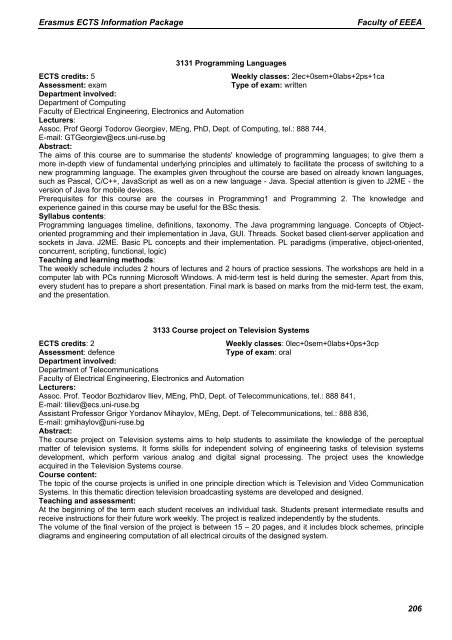Erasmus ECTS Information Package
Erasmus ECTS Information Package
Erasmus ECTS Information Package
Create successful ePaper yourself
Turn your PDF publications into a flip-book with our unique Google optimized e-Paper software.
<strong>Erasmus</strong> <strong>ECTS</strong> <strong>Information</strong> <strong>Package</strong><br />
Faculty of EEEA<br />
3131 Programming Languages<br />
<strong>ECTS</strong> credits: 5<br />
Weekly classes: 2lec+0sem+0labs+2ps+1ca<br />
Assessment: exam<br />
Type of exam: written<br />
Department involved:<br />
Department of Computing<br />
Faculty of Electrical Engineering, Electronics and Automation<br />
Lecturers:<br />
Assoc. Prof Georgi Todorov Georgiev, MEng, PhD, Dept. of Computing, tel.: 888 744,<br />
E-mail: GTGeorgiev@ecs.uni-ruse.bg<br />
Abstract:<br />
The aims of this course are to summarise the students' knowledge of programming languages; to give them a<br />
more in-depth view of fundamental underlying principles and ultimately to facilitate the process of switching to a<br />
new programming language. The examples given throughout the course are based on already known languages,<br />
such as Pascal, C/C++, JavaScript as well as on a new language - Java. Special attention is given to J2ME - the<br />
version of Java for mobile devices.<br />
Prerequisites for this course are the courses in Programming1 and Programming 2. The knowledge and<br />
experience gained in this course may be useful for the BSc thesis.<br />
Syllabus contents:<br />
Programming languages timeline, definitions, taxonomy. The Java programming language. Concepts of Objectoriented<br />
programming and their implementation in Java, GUI. Threads. Socket based client-server application and<br />
sockets in Java. J2ME. Basic PL concepts and their implementation. PL paradigms (imperative, object-oriented,<br />
concurrent, scripting, functional, logic)<br />
Teaching and learning methods:<br />
The weekly schedule includes 2 hours of lectures and 2 hours of practice sessions. The workshops are held in a<br />
computer lab with PCs running Microsoft Windows. A mid-term test is held during the semester. Apart from this,<br />
every student has to prepare a short presentation. Final mark is based on marks from the mid-term test, the exam,<br />
and the presentation.<br />
3133 Course project on Television Systems<br />
<strong>ECTS</strong> credits: 2<br />
Weekly classes: 0lec+0sem+0labs+0ps+3cp<br />
Assessment: defence<br />
Type of exam: oral<br />
Department involved:<br />
Department of Telecommunications<br />
Faculty of Electrical Engineering, Electronics and Automation<br />
Lecturers:<br />
Assoc. Prof. Teodor Bozhidarov Iliev, MEng, PhD, Dept. of Telecommunications, tel.: 888 841,<br />
E-mail: tiliev@ecs.uni-ruse.bg<br />
Assistant Professor Grigor Yordanov Mihaylov, MEng, Dept. of Telecommunications, tel.: 888 836,<br />
E-mail: gmihaylov@uni-ruse.bg<br />
Abstract:<br />
The course project on Television systems aims to help students to assimilate the knowledge of the perceptual<br />
matter of television systems. It forms skills for independent solving of engineering tasks of television systems<br />
development, which perform various analog and digital signal processing. The project uses the knowledge<br />
acquired in the Television Systems course.<br />
Course content:<br />
The topic of the course projects is unified in one principle direction which is Television and Video Communication<br />
Systems. In this thematic direction television broadcasting systems are developed and designed.<br />
Teaching and assessment:<br />
At the beginning of the term each student receives an individual task. Students present intermediate results and<br />
receive instructions for their future work weekly. The project is realized independently by the students.<br />
The volume of the final version of the project is between 15 – 20 pages, and it includes block schemes, principle<br />
diagrams and engineering computation of all electrical circuits of the designed system.<br />
206
















